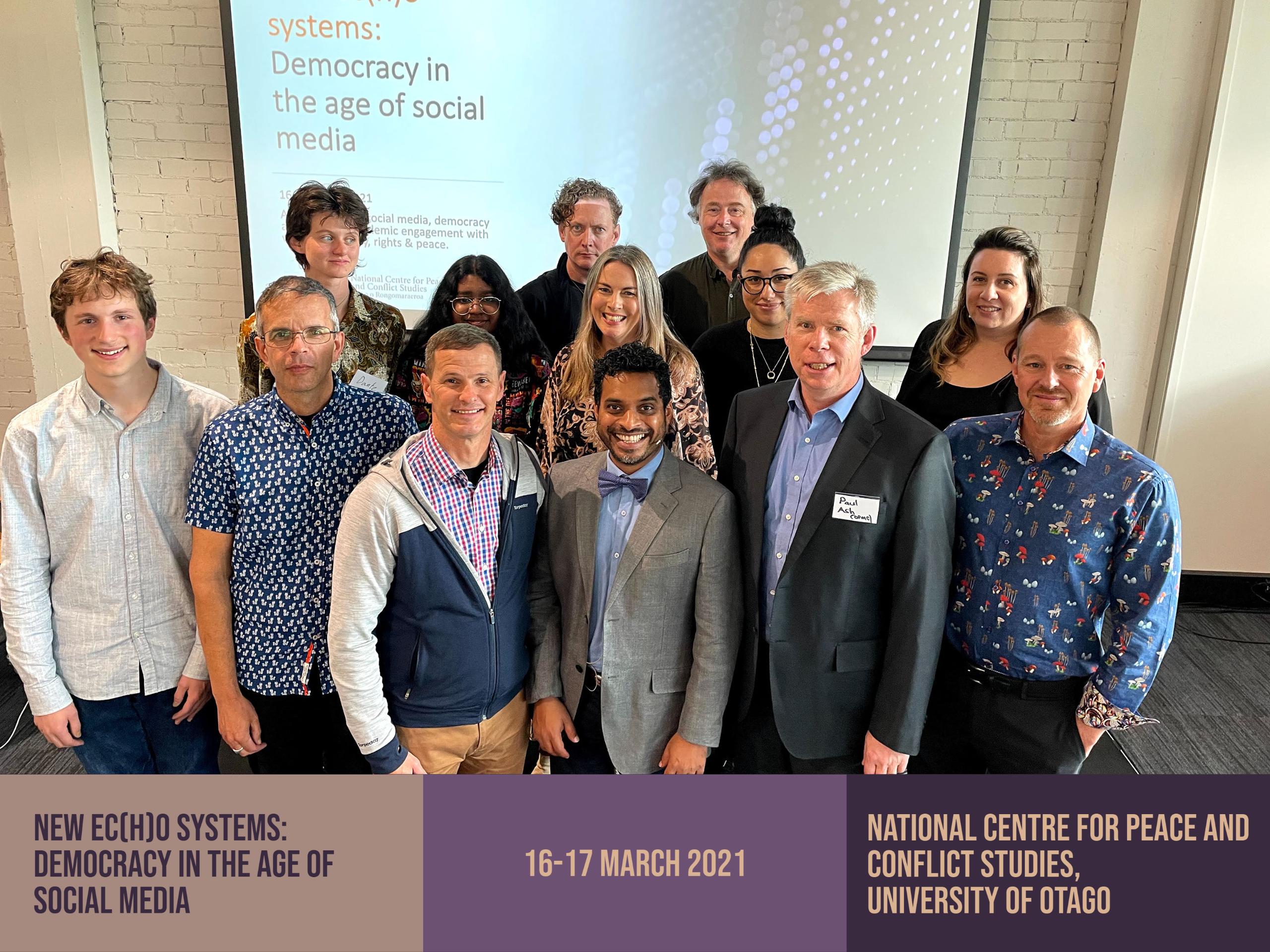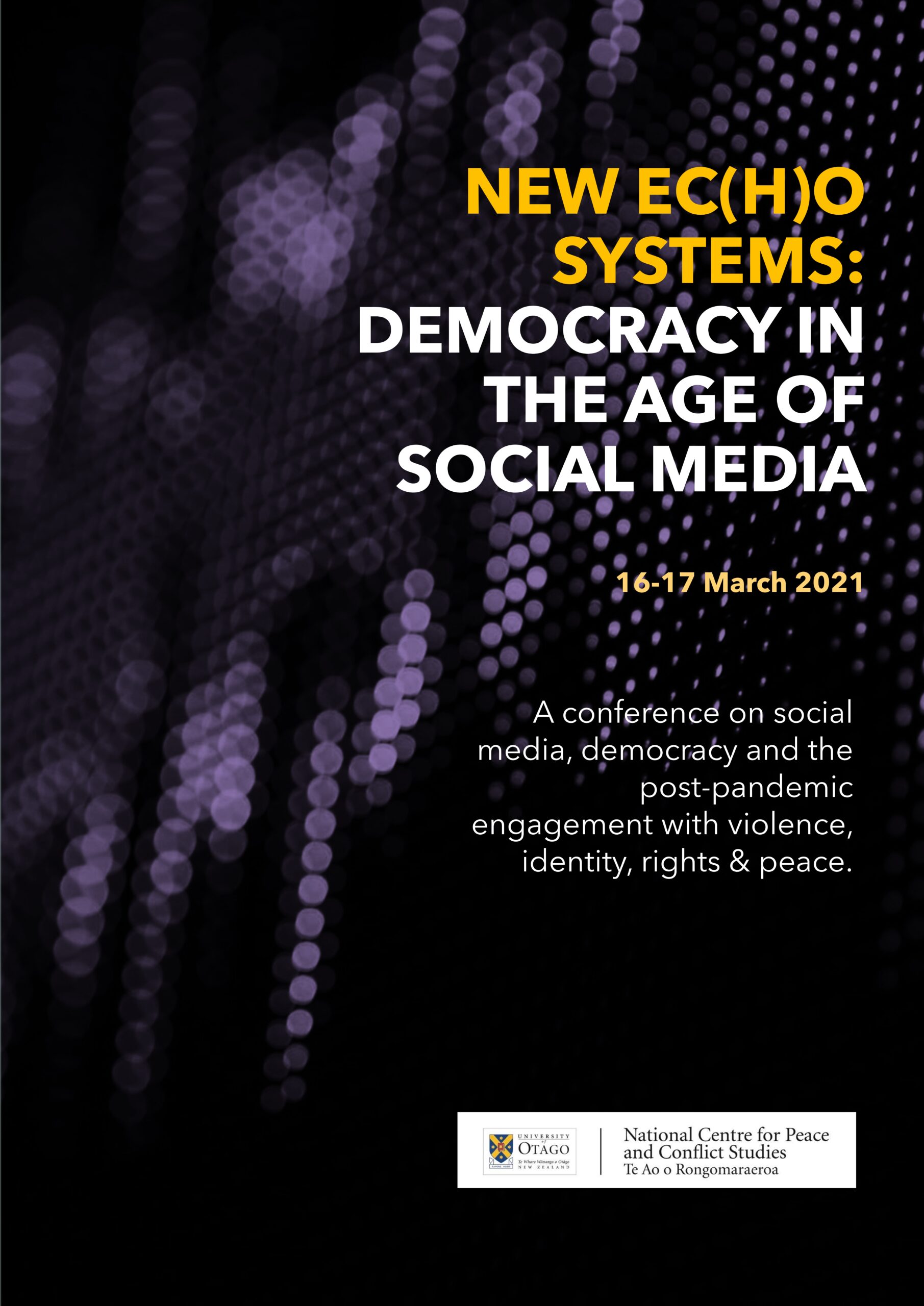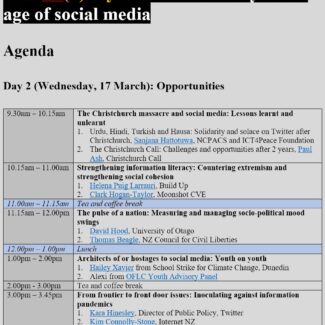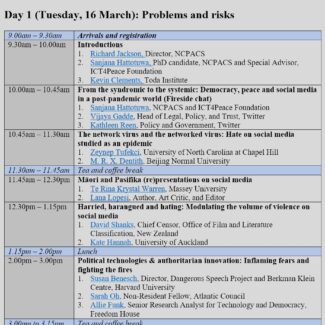Conceived of and curated by ICT4Peace Foundation’s Special Advisor Sanjana Hattotuwa, the New Ec(h)o systems: Democracy in the age of social media conference was held at the University of Otago, New Zealand from 16-17 March 2021 under the institutional auspices of the National Centre for Peace and Conflict Studies (NCPACS). Hattotuwa is currently a PhD candidate at NCPACS. The conference is the culmination of the first of its kind Data for Good partnership in New Zealand with Twitter.
In late-2019, Sanjana was invited by Twitter to undertake more rigorous study of consequential platform dynamics in response to the Christchurch massacre after the publication of Pulse Points, an op-ed on Scoop.
The launch of the Data for Good partnership with NCPACS was eclipsed by the rapid onset of Covid-19 and the resulting national lockdown in New Zealand. Sanjana integrated the research on Christchurch into his doctoral thesis, and presented on the second day of the conference, highlights of his findings. The relevant chapter was also sent to those in government, in order to add to the evidence base leading to policymaking around countering violent extremism online, disinformation, platform health and civility as well as social cohesion in New Zealand.
Download a description of the conference and its objectives here.
The two-day conference, held at the University of Otago campus in Dunedin, featured an extraordinary selection of of renowned speakers from New Zealand the world, including leading academics, activists, a Time Person of the Year, a Time TIME100 Next awardee, representatives from the highest levels of government including the Christchurch Call and the country’s Chief Censor. Speakers came and connected from the US, UK, India, Australia and the Philippines, in addition to those in the room. Over 60 participants attended the conference in-person. Proceedings were live-streamed on Zoom as well, with 149 participants connecting on Day 1 and 78 on Day 2. The conference saw the highest engagement on the NCPACS Facebook and Twitter accounts since their inception.
As noted by one of the participants in an article capturing the conference, Gadde’s engagement was part of a “…high-level participation at the two-day conference by three of Twitter’s managers” in what was “one of the first times that Twitter has engaged in such a public forum to explain its stance on free speech since the US Capitol was stormed on January 6.” Joined by Kathleen Reen from Twitter, Vijaya Gadde engaged in a roughly 40-minute one-on-one, unscripted conversation with Sanjana, going over some of the most significant decisions the company had taken earlier this year as well as issues around human rights, due process, platform oversight, regulation, disinformation, misinformation, ethics, countering violent extremism and related topics. Gadde provided an overview of the terrain covered in tweet thread soon after the session concluded, and flagged both Sanjana’s research on Christchurch as well as the engagement at the conference to New Zealand’s Prime Minister, Jacinda Ardern.
Pleased to join @sanjanah and team at @NCPACS for an important discussion exactly two years on from the tragedy of the #Christchurch mosque attacks. We talk about the importance of the #OpenInternet as part of our ongoing #DataForGood work 👇 https://t.co/skKco20LCS
— Vijaya Gadde (@vijaya) March 15, 2021
Notably @sanjanah’s research found the most salient conversations happening on Twitter in the aftermath of the violent attacks were those offering messages of support and solidarity with the victims. This held true even 6 months after the attacks took place.
— Vijaya Gadde (@vijaya) March 15, 2021
We know we have more to do and we are grateful for @jacindaardern and the New Zealand Government’s leadership on these issues. Together with civil society and academia, we are committed to empowering public conversation and challenging online extremism.
— Vijaya Gadde (@vijaya) March 15, 2021
Featuring a dozen compelling sessions, the conference was New Zealand’s first to take a whole-of-government and whole-of-society approach to issues and recommendations flagged in the report of the significant Royal Commission of Inquiry into the terrorist attack on Christchurch masjidain on 15 March 2019. As Sanjana noted in the University of Otago’s coverage of the conference,
“In the midst of a tsunami of regional and global discussions around social media regulation, it aims to unpack a lot of what we read about and question assumptions. It will highlight global conversations around social media and democracy and help share New Zealand experiences, and the moral leadership of the Christchurch Call, with the world… Sessions cover a wide range of perspectives, including youth, Māori and Pacific peoples. Each is anchored to speak to a domestic, regional or global issue that lies at the heart of complex yet pressing conversations around how to grapple with social media’s impact on democracy. The good and the bad.”
Every session was carefully framed to capture and explore some of the most significant questions and issues relevant to the issue it focussed on, from both domestic and global perspectives.

Speakers included David Shanks, New Zealand’s Chief Censor, Paul Ash, of Christchurch Call and the Prime Minister’s Special Representative on Cyber and Digital, Nicole Matejic, of the Department of Internal Affairs, Maria Ressa, a Time Person of the Year and renowned Philippine journalist, Zeynep Tufekci from University of North Carolina at Chapel Hill, Susan Benesch, Director of Dangerous Speech Project, and Meenakshi Ganguly, South Asia Director of Human Rights Watch.
The full list of speakers included,
- Vijaya Gadde, Head of Legal, Policy, and Trust, Twitter
- Kathleen Reen, Policy and Government, Twitter
- Zeynep Tufekci, University of North Carolina at Chapel Hill
- M. R. X. Dentith, Beijing Normal University
- Te Rina Krystal Warren, Massey University
- Lana Lopesi, Author, Art Critic, and Editor
- David Shanks, Chief Censor, Office of Film and Literature Classification
- Kate Hannah, University of Auckland
- Susan Benesch, Director, Dangerous Speech Project and Berkman Klein Centre, Harvard University
- Sarah Oh, Non-Resident Fellow, Atlantic Council
- Allie Funk, Senior Research Analyst for Technology and Democracy, Freedom House
- David Kirkpatrick, Founder of Techonomy and author of ‘The Facebook Effect: The Inside Story of the Company that is Connecting the World.
- Victoire Rio, Myanmar Tech Accountability Network
- Meenakshi Ganguly, South Asia Director, Human Rights Watch
- Maria Ressa, Rappler
- Stephen Davis, Reporter and writer
- Paul Ash, Christchurch Call
- Helena Puig Larrauri, Build Up
- Clark Hogan-Taylor, Moonshot CVE
- David Hood, University of Otago
- Thomas Beagle, NZ Council for Civil Liberties
- Youth representatives from the School Strike for Climate Change, Dunedin
- Representative from OFLC Youth Advisory Panel
- Kara Hinesley, Director of Public Policy, Twitter
- Kim Connolly-Stone, Internet NZ
- Nicole Matejic, Principal Advisor Digital Safety, Department of Internal Affairs
The Prime Minister of New Zealand, Rt Hon Jacinda Ardern, also sent a special message for the conference, which was played back on the first day.
Download a PDF of the session details and speakers here.
Many repeatedly asked Sanjana how he managed to gather the calibre of speakers who presented at the conference. His response was simple. New Zealand provides a rare opportunity to get right, meaningfully address and, through public policy, shape progressive engagement with issues we discussed at the conference. As was evident in formal presentations and plenary discussions, the calibre of debate within the country on these issues is enviably high. All the speakers knew this and were rooting for Aotearoa. What happens in New Zealand around policy, media ecologies, regulations, civil liberties and, importantly, social cohesion will inevitably impact and influence other contexts. This conference was a timely and unique contribution to these debates.
All the presentations by the speakers will be posted on YouTube.
Media coverage
- Complex yet critical discussions to be had at conference, Otago University
- Possibilities, pitfalls of social media on agenda, Otago Daily Times
- US welcome in battle against online extremism, conference told, Otago Daily Times
- Optimism over countering hate speech, Otago Daily Times
- Battle against online harm beefs up censor’s power, Radio New Zealand (RNZ)
- Geoffrey Miller: Twitter uses Dunedin conference to explain approach to political expression which was republished on Rappler.
- Taming the ‘wild west’ of the internet, Newsroom
- Democracy in the age of social media: Podcast of radio interview by OAR FM Dunedin, broadcast on 23 March 2021.



